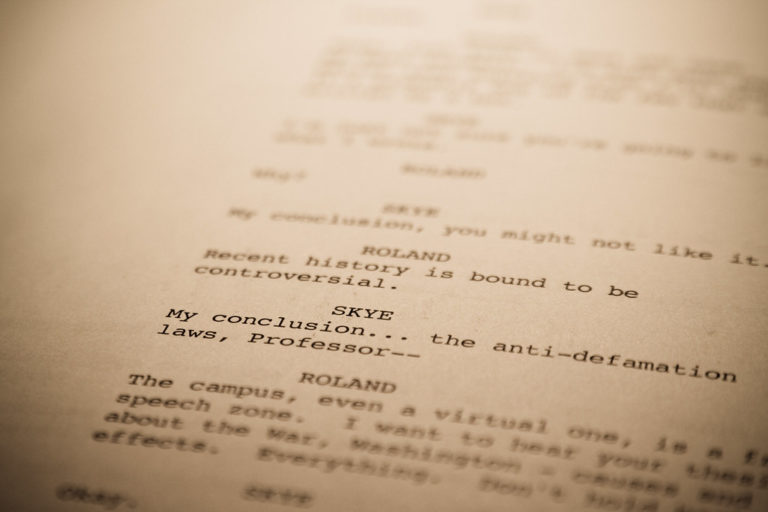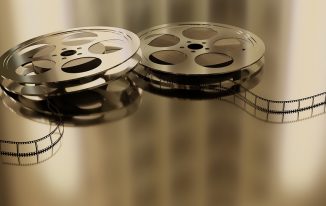“Screenwriting is like ironing. You move forward a little bit and go back to smooth things out.”
– Paul Thomas Anderson
Once again, welcome to our ongoing series, which is anything but boring. In the previous article, we talked about characters and today we will focus on the importance of these characters’ dialogues.
The Skills of a Screenwriter
5. Writing Dynamic Dialogue
“Dialogue works least when it’s telling you what’s going on”
–Tom Rickman

A good screenwriter only writes dialogue when she or she cannot communicate the information visually. Hence, the saying “actions talk louder than words” applies to the context of filmmaking and video production. If a scriptwriter can utilise an action instead of a character’s spoken words, he or she will privilege action. However, this rule is more lenient in the context of television compared to other medium.
It is often said that a scene without dialogues can have a more substantial effect on the audience. What is not said is implicit in the actions. In fact, the absence of spoken words dramatizes the scene and makes it more poignant. It also makes the scene more realistic. It is unlikely a person would be able to talk clearly in well-articulated and controlled manner instants after learning of the death of a close relative or friend.
Therefore, the first step when writing dialogue is to assess if the dialogue is indeed necessary. But, the most common mistake of novice scriptwriters is over-writing. Film and television are visual media. However, it is important to note that television is less visual than cinema and tends to contain more dialogue.
By the stage, a screenwriter will approach the writing of dialogue and have a clear idea of the story’s actions and characters. Dialogue supports and develops these two elements. Dialogue must either advance the action or reveal aspects, whether of a character’s interior or exterior facets. When a screenwriter uses dialogue, it is short, lean and purposeful.
For example, social niceties can be used in some situations, such as an exchange between an estranged father and son. The distance between them will be emphasised because the whole interaction consists of only niceties and comments about the weather and other such sundry information. However, this seemingly useless dialogue achieves a purpose: it will highlight the distance between a father and son who had an argument ten years ago and have not since talked to each other. The dialogue remains purposeful.
The scriptwriter also considers the aural qualities of the chosen words and the use of silence. This advanced engagement with language foregrounds the musicality of dialogue as well as its functionality. Good dialogue is similar to the manner in which people talk. Often people do not use the appropriate grammar when talking. However, dialogue in a script is typically more focused than real conversation. For example, the scriptwriter removes or reduces significantly the ‘hmms’ and ‘ands’.
Although the scriptwriter uses dialogue sparingly, the dialogue still plays a very important role in the script. It is the only aspect of the script that creates a direct communication between the scriptwriter and the audience. Scene descriptions are useful to the director and cinematographer, who translate the instructions into images. It is the closest thing to a direct means of communication with an audience in a similar manner to the text of a novel with its reader.
Now let us review some of the objectives of dialogues in a movie:
- Develop and reveal things about the characters:
Good dialogue originates from the character and consequently reveals something about this character. Education, social class and personal traits are some factors that will provide individualistic features to the dialogue of a character. Moreover, differences in speech across scenes also reveal the character’s mood or emotions.
- Refer back to the dramatic need of the character:
Dialogue references the objective of a character as identified in the story concept. Good dialogue will either reveal or attempt to hide the motivations of a character in the scene, which are linked to what that character wants to do in the film.
- Advance the action:
Good dialogue arises out of the preceding action and leads into the next action. In this sense, well-written dialogue in a script is connective. This type of dialogue also advances the action. Dialogue can serve as an exposition device. It reveals past events or the backstory of characters.
- Serve as an exposition device:
A well-written conversation will reveal a wealth of information about the characters because of what they say to each other and how they react to what is said. Conversations reveal the dynamics among characters. The scriptwriter considers who controls the conversation and when a shift in power happens. Carefully planned, such a conversation will reveal a lifelong relationship in a few seconds.
- Foreshadow future events:
Dialogue also prepares the audience about forthcoming events by foreshadowing them. Foreshadowing does not reveal the outcome but accentuates factors that result in the outcome. It is subtle and should not reveal the ending of the film or the twist of the story. However, it ensures that the final events are believable as the audience has been prepared. In some cases, such dialogue can have an ominous ring to it.
So, do you think that dialogue is important in a movie? Please share your comments!




